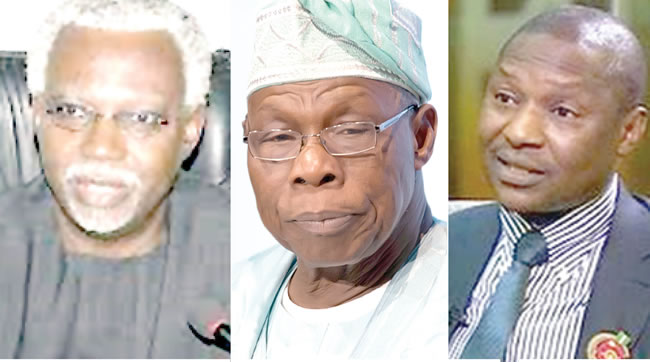Who is empowered by the constitution to review the take-home of public officers? Lawyer and aide to three Chief Justices of Nigeria, Ahuraka Yususf Isah, takes a look at what appears as conflicting schedules of two agencies of government saddled with civil service pay.
On September 1, 2022, the National Salaries and Wages Commission disclosed that President Muhammadu Buhari has approved the upward review of Duty Tour Allowances (DTAs) for ministers, permanent secretaries and federal civil servants on level one to 17. The acting chairman of the commission, Mr Ekpo Nta conveyed the approval in a circular dated August 31, 2022; with the takeoff date listed as September 1, 2022.
According to the former chairman of the Independent Corrupt Practices and other related offences, Buhari approved the upward review of duty tour allowances applicable to permanent secretary/equivalent from N20,0000 to N70,000, and to minister/SGF/HCSF/Equivalent, from N35,000 to N80,000.
The Commission, in February this year, equally announced that President Buhari had approved a 100% increase in the Duty Tour Allowance of workers in the federal public service, which took effect from February 1, 2022. However, the ministers, Secretary to the Government of the Federation and Head of Civil Service of the Federation were not covered in the February 2022 circular, which obviously necessitated the most recent approval.
Part ll Section 3 of the National Salaries Income and Wages Commission Act spelt out the functions of the Commission, to include “advise the Federal Government on national incomes policy: recommend the proportions of income growth which should be utilised for general wage increase: inform the Federal Government of current and incipient trends in wages and propose guidelines within which increase in wages should be confined.”
This law, which came into effect on August 1993, states that it is ‘’An Act to establish the National Salaries, Incomes and Wages Commission to, among other things, advise the Federal and State Governments on national income policy.”
In other words, there is nowhere the function of reviewing salaries and allowances of the Political, Public and Judicial Office Holders by the Commission is mentioned in the Act.
However, Decree No. 49 of 1989 established the National Revenue Mobilisation Allocation and Fiscal Commission (NRMAFC), a body created to handle revenue allocation and fiscal matters on a continuous basis. That Decree was later amended by Decree No. 98 of 1993 (now an Act of National Assembly – christened as RMAFC Act Cap. R7 LFN 2004) which also renamed the Commission as Revenue Mobilisation Allocation and Fiscal Commission (RMAFC). The Commission is also listed in the 1999 Constitution of the Federal Republic of Nigeria (As Amended) under Section 153(1) as one of the fourteen (14) Federal Executive Bodies.
Meanwhile, Section 84 (1) of the 1999 Constitution (as amended) mandates the Revenue Mobilization, Allocation and Fiscal Commission (RMAFC) to determine and fix the salaries and allowances of public officers. It was by virtue of this constitutional power that the RMAFC ensured the enactment of the ‘’Certain Political, Public and Judicial Office Holders (Salaries and Allowances, etc.) (Amendment) Act, 2008’’ which came into force on February 1, 2007.
Part 1 Paragraph B of this 2008 Act dictates the allowances and fringe benefits for the Federal Executive Officers which include the President and his Vice, Ministers, SGF, HOS, Permanent Secretaries, Commission Chairmen and their Members among others.
For instance, the Duty Tour allowance for ministers, is N35,000 and N20,000 for the permanent secretaries, while their Estacode stands at $900 for ministers and $600 for permanent secretaries, according to the RMAFC (2008 Act).
This makes it clear the agency saddled with the responsibility of a review, but if the argument is accepted, that the National Salaries, Incomes and Wages Commission can in alternative to the RMAFC fix salaries and allowances of the civil and public servants, what’s the rationale for special and selective treatment for the Federal Executive Officers.
The Academic Staff Union of Universities (ASUU) has been on strike for over six months, thereby crippling the nation’s education growth. In some progressive climes, attention would have been towards solving the logjam for the sake of the future of the country.
There is also the long-standing issue of judges demanding for a review of their salaries and allowances which were last reviewed with the enactment of the ’Certain Political, Public and Judicial Office Holders (Salaries and Allowances, etc.) (Amendment) Act’ in 2008. In addition, the judges are contesting that since their work schedules have no semblance to that of political and public office holders like the lawmakers, presidents, governors and ministers, their salaries and allowances should be detached from the Act. Besides, the review of their salary and allowances should be done at short intervals, because while the political and other public office holders have other bountiful sources of earning, they, the judges, have limited and paltry extra sources, to make things up.
Of course, the argument of the judges is valid. While the federal lawmakers have opportunities and latitudes to leverage, to build their monthly take-home, with utter impunity, ministers, permanent secretaries and even the president or governors can reach out to monstrous amounts of money, far above what are prescribed for them, in the salary and allowances act.
The judges, however, are entitled, strictly to what the act prescribed to be paid them, and stand the risk of earning same amount of money month after month and year after year, until they are elevated to a court of higher jurisdiction. A Supreme Court Justice for instance continues to earn same monthly salary and allowances till he retires. It is the same take-home pay paid to the apex court justices in 2008 that is being paid till date, 14 years after. That was when one dollar was exchanging for less than one hundred naira compared to current rate of $1 to N710.
This is the underlining factor in the never-seen-before protest by 14 Supreme Court Justices mid-June this year, against the then-sitting Chief Justice of Nigeria, Justice Ibrahim Tanko Muhammad, over tardy payment of internally-organized allowances. In the letter they addressed to Justice Muhammad entitled ‘The state of affairs in the Supreme Court of Nigeria and Demand by Justices of the Supreme Court,’ the jurists stated that it was a wakeup call on the CJN to quickly and swiftly solve their palpable inhospitable working conditions.
They said some of the justices appointed in 2020 were yet to be accommodated or given full complement of their vehicles, just as they were served with high electricity tariff and inadequate supply of diesel. Other issues included absence of internet services to their residences and chambers as well as epileptic electricity supply to the court. Justice Ibrahim Tanko Muhammad had to resign on the ground of ill-health on June 27, 2022 as the CJN, to pave the way for peace and harmony in the apex court bench.
The issue of stagnant salaries and allowances being received by judges was what triggered the Supreme Court, in the first instance, to devise payment of other allowances to supplement and cushion the adverse effects of the refusal to review their salaries and allowances.
The courts are not revenue-making institutions, hence they depend on yearly budgetary allocations to pay statutory justices’ salary and allowances, contained in the Act mentioned above and supplementary allowances such as the ones the Supreme Court Justices kicked over, which led to the ouster of Tanko.
Since 2015, all can’t be said to have been well, with budgetary allocations to the judiciary. Despite the outcry in the judiciary over the declining budget share for the third arm of government, curiously, President Muhammadu Buhari’s first appropriation act was to reduce previous figure he met by allocating N70 billion budget for the entire nation’s judiciary in the 2016 fiscal year, which was N3billion lower than the N73 billion appropriated for the system in 2015.
In the 2017 fiscal year, judiciary budget was increased to N100 billion, and in 2018, it was also increased to N110 billion, and remains at N110 billion for 2019, 2020 and 2021. In other words, judiciary budget has remained the same N110 billion for four consecutive years. Reluctantly, it was increased to N120 billion for the current 2022 fiscal year.
While marking the 2022/2023 legal year on September 12, 2022, President of the Court of Appeal, Justice Monica Dongban-Mensem, disclosed that the Federal Government was yet to release funds, to constitute the election petitions tribunals for the 2023 electoral litigation process.
She stressed that election tribunals are an integral part of the electoral process in Nigeria, whose function, “is pivotal to the just and timely resolution of election matters….that must be done cautiously, conscientiously and diligently”.
Without doubt, the way and manner the government of the day has been handling matters concerning education and judiciary, especially the funding of these critical sectors, leave much to be desired. Beside the legitimacy question of increasing some allowances for ministers and the permanent secretaries, it equally defies acceptable logic, public morality and conscience, to give more to those who have, against those who have not.
ALSO READ FROM NIGERIAN TRIBUNE
EDITORIAL: The Passing Of Queen Elizabeth II
ASUU, FG must find middle ground to end strike ― Gbajabiamila
TUESDAY FLAT OUT: Queen Elizabeth II: Lessons From A Monarch
ASUU, FG must find middle ground to end strike ― Gbajabiamila






